The Bull Moose and Old Hickory
The hardest of the hard men to occupy the Oval Office, and some words on current events.
Over the past several days, much ink has been spilled on the attempted assassination of then-presidential candidate and former president, Theodore Roosevelt.

I'm sure you can guess why people might be talking about it.
The day - October 14th. The year - 1912. Four years prior, Roosevelt had stepped away from Presidential aspirations after serving a duly-elected term and finishing the first of William McKinley’s, which he had inherited after the latter’s assassination in 1901. Roosevelt had promised the public that he would not seek a second full term - a promise he honored. Instead, he shuffled a close personal friend and Secretary of War, William Howard Taft, into the driver’s seat of the Republican Party. With the Rough Rider’s support, Taft would handily defeat the legendary left-wing populist, William Jennings Bryan for the honor of being the 27th President of the United States.
Unfortunately for everyone involved - especially the American public - Taft proved to be… well, it could be generously put that he was a less than ideal candidate for the job for a multitude of reasons. Taft, at the beginning of his term, was seen as something of a crony for Roosevelt by their Democrat enemies - a sniveling little (or not so little, given Taft’s infamous girth) sycophant who was a stooge for Ol’ Ted, bereft of agency or originality, who was single-handedly picked by Roosevelt to continue his agenda despite his own personal abdication of office.
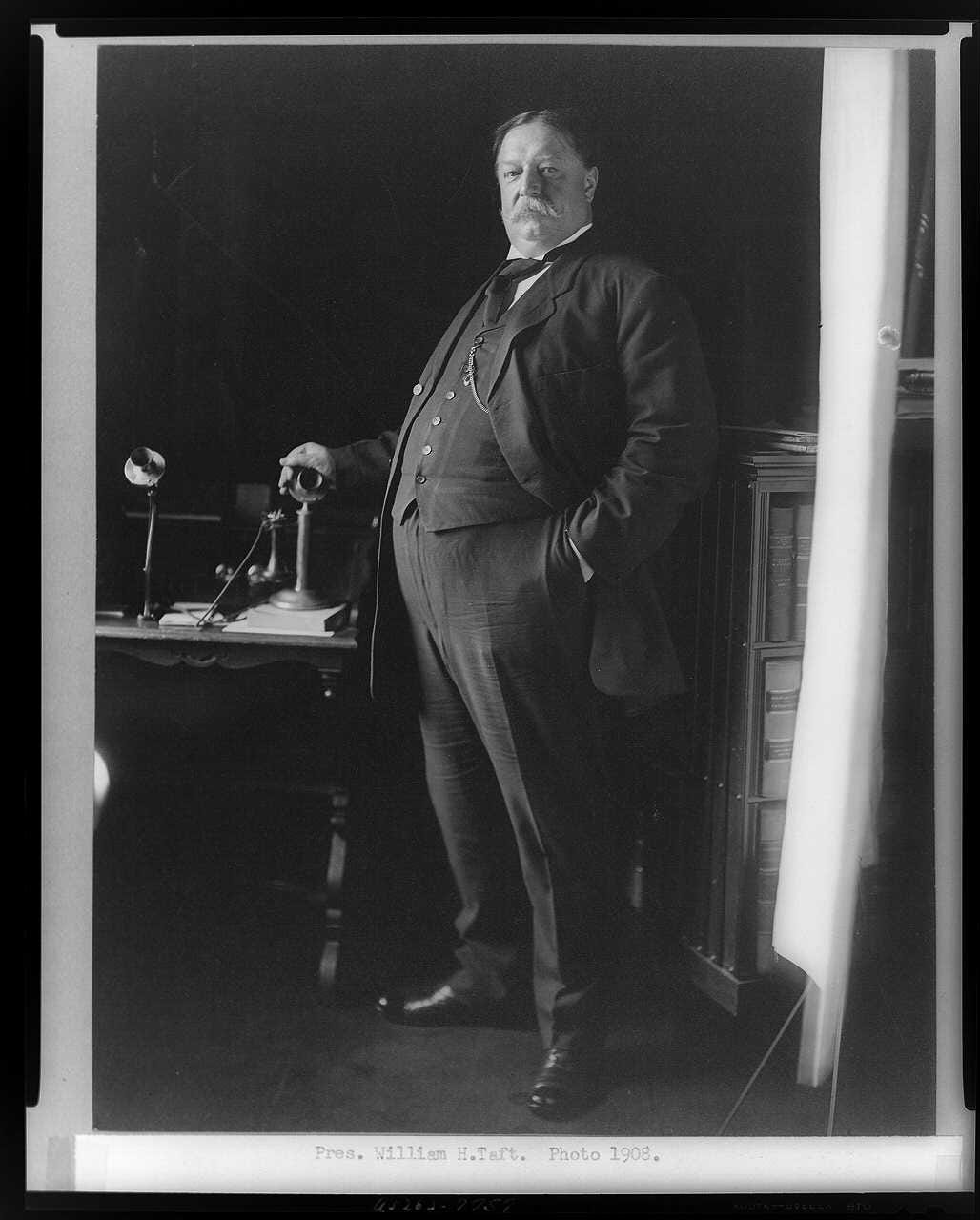
In truth, it didn’t take long for the two men to fall out behind the scenes. Roosevelt was a Progressive, which is a political term that meant something entirely different in the 1910’s than it does today. Taft, on the other hand, rapidly proved to be more in step with the conservative elements of the Republican Party, which the progressive Roosevelt did not play all that nice with. The minutiae of it all is a bit much to discuss now, but, suffice to say, Taft was not as sympatico with Roosevelt as the two probably believed themselves to be at first. It doesn’t help that, according to most sources, Taft never really wanted to be president to begin with, and only threw his name in the hat after being extensively cajoled by Roosevelt. To which I say, hey - smart man.
Having effectively and efficiently squandered any and all good-will engendered by his relationship with Roosevelt during his term, Taft again ran for office in 1912 in what I believe he had to know was a doomed campaign, because that’s really just what incumbent presidents do, whether it’s a good idea or not. Not only was Taft pitted against then-Governor of New Jersey, Woodrow Wilson, running on the Democrat ticket, and dedicated socialist Eugene V. Debs, one of the founders of the notorious international union, Industrial Workers of the World, but also his erstwhile ally. Displeased with the deviation from what he must have seen as something of a friendly gentleman’s agreement, Roosevelt took it upon himself to run as an independent candidate under his own political party, dubbed the Progressive Party. This party is perhaps better remembered by the sobriquet The Bull Moose Party, which was a title cribbed from Roosevelt’s nickname, The Bull Moose. If you know anything about mighty and majestic moose, you know why it was a fitting title for a man like Theodore Roosevelt. They may look silly, but they’ll kill you dead, man. Deader than dead. I went outside of my house one night and was surprised by three juvenile moose and a cow in my front yard, peacefully grazing on a tree. Fortunately, they were less surprised by me than I was them, since otherwise there was a real possibility I would have been trampled to death by thirteen hundred pounds of pure storm and fury.
This brings us to the fateful day - October 14th, 1912. After eating dinner at the Gilpatrick Hotel in Milwaukee, Wisconsin before a highly-anticipated campaign event, Roosevelt left the hotel after his delightful supper to find himself before a raucous crowd of supporters. Deciding to briefly address the crowd before leaving for the Milwaukee Auditorium, Roosevelt stood before them, giving a saloon-keeper by the name of John Schrank an opportunity to act. Schrank - who had been anticipating Roosevelt’s arrival since catching wind of it in the newspapers - rushed forward, pressed a .38 Colt revolver against the former President’s chest, and fired.
John Schrank, for his part, was a Bavarian-born tavern owner from New York. Though he was not known to be a trouble-maker, a number of personal tragedies had taken a severe toll on his mental health. He became obsessed with the former president and stalked him throughout a number of states and campaign events before finally pulling the trigger in Milwaukee after reportedly being visited by the ghost of the slain president, William McKinley, told him to avenge his assassination by merc’ing his former Vice-President.
As a chorus of shock rose from the crowd, Roosevelt stumbled backwards as his personal body-guards piled onto Schrank and wrestled him into submission. He took only a moment to compose himself before flashing the crowd his broad, trademark grin and waving his hat, all with a bleeding hole blown through his waistcoat. His personal aid, Harry Cochems, rushed to his side. When asked if he had been injured, Roosevelt calmly and quietly responded, "He pinked me, Harry.”
Within moments, the crowd was whipped into a braying din of murderous blood lust. Members of the audience pulled aside the police and security surrounding Schrank and set about the self-appointed task of showing the wayward barkeep proper street justice for trying to ice the beloved former President, accompanied by cries of Kill him! and Hang him! from the onlookers. Roosevelt himself, however, pushed forward and told them, "Don't hurt him. Bring him here. I want to see him."
Needless to say, the crowd was stunned into a moment of awed silence upon seeing the injured man standing tall, strong, and firm despite the .38 round lodged in his chest.
A nearby onlooker asked one of his neighbors, “Is he okay?”
Hearing the comment, Roosevelt told the crowd, “I’m alright, I’m alright.”
With this reassurance, the crowd erupted into elated applause, which enabled the police to move forward and once again apprehend Schrank. They heeded Roosevelt’s request and brought the would-be assassin to meet his would-be mark. Roosevelt and Schrank studied one another for a moment. Then, Roosevelt took the man by either side of the head, and as stone-cold as it would have been if he intended to crush it with his bare palms like a grape, he only meant to examine Schrank and determine whether or not he’d seen him before.
"What did you do it for?" Roosevelt asked Schrank.
Schrank, being a punk-ass bitch, offered no reply.
"Oh, what's the use?” Roosevelt sighed. “Turn him over to the police. Officers, take charge of him, and see that there is no violence done to him."
As the police escorted Schrank away to the jeering of the incensed crowd, kept in line only by their respect for the requests of the former president, Roosevelt reportedly had these parting words for his presumptive killer; “You poor creature.”
I imagine if Roosevelt had a mic to drop, he would have done spiked that shit like he’d scored a winning touchdown at the Super Bowl. Instead, he simply got into the waiting car and departed for the Milwaukee Auditorium. Not the hospital - the Milwaukee Auditorium. Despite the insistence of his staff that he needed immediate medical attention, Roosevelt, by means of his keen hunting acumen and medical studies, reasoned that, since he was not currently coughing up blood, or anything other than mildly inconvenienced by the bullet in his chest, deduced that he was still fit to deliver his speech. Sure enough, further investigation proved that the bullet, after passing through both the case for his spectacles and the wadded up speech in his breast pocket, had stopped short of piercing his heart or a lung. Fortuitous is one word for it. Divine intervention is another.
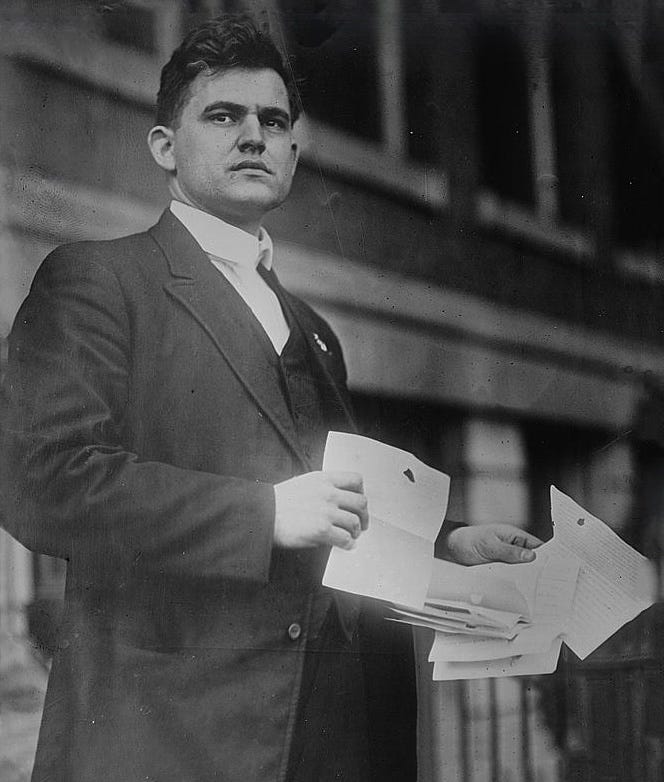
Upon arriving at the Milwaukee Auditorium, Roosevelt, still bleeding, with a god damn .38 special stuck in his chest, took the stage standing tall and proud.
"Ladies and gentlemen,” he told the waiting audience. “I don't know whether you fully understand that I have just been shot, but it takes more than that to kill a Bull Moose."
I have to imagine that the crowd, as the kids would say today, tore the pit up. Roosevelt delivered his full speech for fifty minutes before presenting to a hospital. There, the doctors found the round lodged in Roosevelt’s chest muscles. They decided it was best left where it was. If that sounds like a bad call, one must keep in mind that removing a bullet from a gunshot wound was exactly what led to the gangrenous infection that ultimately killed William McKinley - the very same president that Roosevelt had served under and, apparently, the vengeful spirit that sought to drag him into the great hereafter alongside him. I must stress apparently, there. We only have Schrank’s personal and questionable testimony on that one.
The bullet would never be removed, and Roosevelt would carry it with him for the rest of his life as something of a mark of well-deserved pride. Oh, and if you’re curious, John Schrank was found not guilty by cause of insanity, and institutionalized for the rest of his life. Roosevelt called bullshit on that one; Schrank had started his feverish stalking of Teddy in Louisiana, and Roosevelt was convinced that he waited until they arrived in a northern state to strike as a crowd in the dank bayous of Arcadia or the deepest, most humid stretches of Alabama would have lynched him on the spot for shooting a former president, whether the wounded head of state politely requested them to abstain or not.
Unfortunately, due to the plurality of candidates and the rift in the Republican Party, Roosevelt would not win the election campaign, even though this event alone should have made him a shoe-in. Ultimately, Roosevelt would rack up an impressive 88 electoral votes and six states. Debs, perhaps unsurprisingly, would claim no votes and no states. Taft would only garner eight votes and two states. The lion’s share of the electoral votes, however - 435 of them, to be precise, and forty states - would go to Wilson. I’m not saying that America, and perhaps the world, would have been a better place were that not to have happened, but…
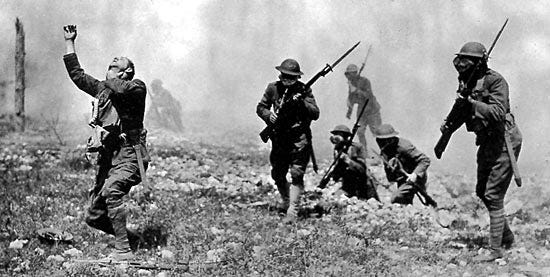
One must wonder1.
Let’s just call this episode exactly what it is - and that would be stone cold gangster shit. It is just one of the many anecdotes that cements, in my opinion, Theodore Roosevelt as the most hard president of all time. I’m not saying he’s the G.O.A.T., but you can’t have the discussion without him in it.

The only reason Teddy isn’t the unanimous choice for the Oval Office G.O.A.T. is because this guy also existed.
Though old, feeble, and frail in this rare photo, anyone with even a cursory familiarity of American history knows that Andrew Jackson was also one tough mother fucker. There is much debate about how many duels that Jackson engaged in throughout his long life, but the general consensus is not as many as we like to think. Which was still probably a lot.
The guy was quick to throw down, sure, but everyone else was rightly hesitant to take him up on the offer. The only confirmed casualty from his dueling career was a man named Charles Dickinson in 1806. Apparently, the two were beefing at a horse race when Dickinson made the fateful decision of besmirching the character of Jackson’s wife, Rachel, while the two bickered - a very poor choice that proved to be quite hazardous to his health. Now, you have to understand that Jackson, it seemed, loved three things above all else in life; fighting, drinking, and his wife. He loved her almost as much as he hated bankers2. As rapper the Tyler the Creator once so eloquently stated, You don’t fuck with a [REDACTED]’s money or his fuckin’ family.
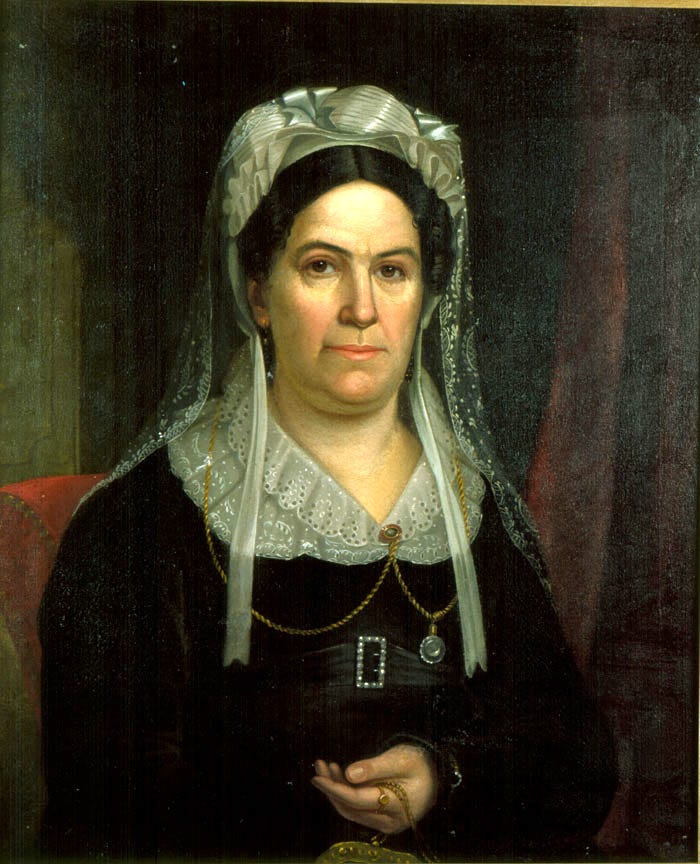
In the resulting duel, Dickinson struck first blood and his Jackson square in the chest. Living up to his nickname of Old Hickory, Jackson tanked it like a champ and returned fire. Jackson walked away. Dickinson didn’t.
One day, I’d love to see a movie made about Jackson in which he pulls out a fat cigar, lights it up with a burning bank note, and walks off while Dickinson bleeds out in the dirt while something like this plays.
Anachronistic? Very. But you have to admit - it definitely fits the mood.
Whether it was teaching his pet parrot to swear in the Oval Office, the great cheese-wheel incident at his inauguration, taking a sword across the face from a British officer as a child for refusing to shine his shoes, being orphaned at fourteen, defeating the British navy with an army of hillbillies and pirates during the Battle of New Orleans, or threatening to merc one of his cabinet members for interrupting his doodle of an alligator -
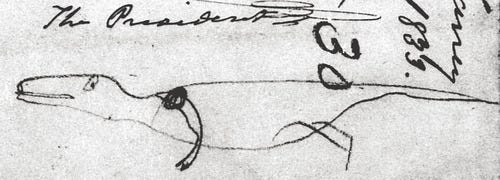
Yes, really - Andrew Jackson’s life is full of borderline unbelievable tales of great heroism, danger, and, at times, almost surreal absurdity.
One of these was the time he was almost assassinated, and the first time any assassination attempt was made on a president of the United States.
January. 1835. A man named Richard Lawrence entered the capitol rotunda because, back in those days, literally anyone could go anywhere in Washington D.C. unmolested. I mean, they used to let the public into the White House during the inaugurations and party on the front lawn. It was a different time.
Anyways, Lawrence had not come to hang out and see the sights, maybe get a George Washington bobblehead or one of those pressed pennies with a picture of the White House stamped on it. He’d come with a mission.
Just kidding.
He wanted to kill Andrew Jackson.
Lawrence, it seems, was a house painter by trade who was, at the time, unemployed and dragging through some hard times. Those that knew him described him as hard-working and polite, but behind that kind facade was a profound and burgeoning unwellness. See, Lawrence was English by birth. For whatever reason, he had fallen under the delusion that he was, indeed, the lost heir to the English throne. It is speculated that exposure to toxic chemicals like lead, antimony, and barium often used in the paints that he would have used daily basically melted his brain. By 1832, he was officially looney tunes. He abruptly ceased his painting job, claiming that the United States government owed him a grand sum of money, so, really, he didn’t need to work. Unbeknownst to everyone, it turned out that Lawrence was actually King Richard III. You know - the last king of the House Plantagenet? The one who was killed at the Battle of Bosworth Field in 1485? The guy who’s skeleton they found under a parking lot in Leicester in 2012?
Yeah. That guy. That was actually Lawrence. Because, I mean - duh. Truly, everyone else was stupid for not knowing that he was actually deceased royalty. To convince everyone, he adopted a kingly drip. He started sporting a comically large mustache, as any monarch worth their salt should. With unknown funds, he swapped out his former drab wardrobe for colorful, flamboyant outfits, which, as a newly minted Professor of Dripology, he would cycle through multiple times a day. The neighborhood children would call him King Richard, which, apparently, he completely failed to realize was a jab at him and probably only enabled his delusions even more. Oh, and he also became highly abusive towards everyone in his family, everyone he lived with, and basically everyone who looked at him the wrong way, and when he wasn’t threatening to kill the house maid for the crime of looking at him funny or beating the daylights out of his sisters, he was lapsing into manic fits of laughter and swearing or just somberly standing in the door way to his house, looking out and no doubt dreaming of the glory that awaited him… after he killed King Andrew.
Apparently, Lawrence was under the impression that Jackson’s famous dissolution of the National Bank was the reason he was not able to claim the money he was owed by the United States Government, or his royal inheritance. He believed that, if Jackson conveniently disappeared and his Vice President, Martin Van Buren, came into office, the latter would inexplicably feel compelled to establish a new National Bank from which he could get his cash-money from. Probably because he saw the mutton-chops on Van Buren and realized he was also insane.
Birds of a feather, and all that.
It’s worth noting that the name King Andrew was bestowed upon Jackson by the leader of the Whig Party, Henry Clay, who, simply put, fucking loathed Andrew Jackson with every withered fiber of his being. He wasn’t alone, either. Only days before the attempt on Jackson’s life, his former vice-president and professional hater, John C. Calhoun, called Jackson A Caesar that ought to have a Brutus.
There’s a lot of talk about decorum, politeness, and civility in politics at the moment, as we’ll soon discuss, but just remember - if you think Trump and Biden sound petulant making swipes at one another in 2024, it’s nothing new. Especially not during the Jacksonian Era of America. When I say these guys hated each other, it really undersells just how much they truly despised one another. When Jackson stepped down as President in 1837, he was asked if he had any regrets. His response was perfectly in character.
“I only have two regrets,” he said. “I didn’t shoot Henry Clay and I didn’t hang John C. Calhoun.”
Again - stone fucking cold.
I’m just saying that I don’t think that kind of rhetoric would fly today, even if the sentiments between politicians hasn’t changed any.
Anyways, Jackson, it just so happened, was at the Rotunda that day - as Lawrence knew he would be - to attend the funeral of a former member of congress, who, knowing Jackson, he probably didn’t care much for. At 68 years old, Jackson was no spring chicken. The guy, as a friend of mine would say, was rode hard and put to bed wet many, many nights of his life, and all that turmoil had taken an extreme physical toll on his body. He was dependent on a cane to walk and often needed assistance from those around him. He probably looked like an easy target. By all accounts, he should have been an easy target.
So, Lawrence, convinced in his delusions that he was about to get the royal bling of England for murdering an American president, jumped out from behind a pillar, a Derringer pistol in hand, charged Jackson and -
Bang.
A loud pop. Smoke. Screams.
Yet Jackson still stood. Confused, no doubt, but unharmed, as Lawrence’s pistol had misfired. The powder in his firearm had failed to ignite.
So he pulled out a second one. The man had come ready. He was gonna take a shot at King Andrew, and he wasn’t gonna miss. And neither was Jackson - at this point, Jackson had gained his wits and, with typical Jacksonian aplomb, broken away from his security detail and begun to storm towards Lawrence, cane raised and ready to smack a bitch down. Again, another pop echoed through to Rotunda. Jackson didn’t so much as stumble, as Lawrence’s second pistol also failed to fire. Unfortunately for Lawrence, he didn’t bring a third gun, and, even if he had, the elderly Jackson had managed to close the distance between them. Old though he was, Jackson had not lost any of his characteristic temper, and he did not appreciate being shot at. Twice.
That day, the security detail that was on site to protect the President from an assassin had to save the assassin from the President. The President’s guards actively struggled to wrench the sixty-eight year old man from his attacker, which should tell you just how fucking pissed he was. Which, yeah - I understand. I’d probably feel the same if someone tried to shoot me not once, but twice. Once they did succeed in separating the two, Jackson began to use his cane to attack his own security so that they would let him go and finish what he started on his would-be assassin. My man Andy wanted to ensure that someone wasn’t leaving the Rotunda alive, and it wasn’t going to be him.
Being sixty-eight and in ill-health, it was not a fight he was going to win, and, soon, he was back in the White House to enjoy a soothing mug of hot tea and cookies (I assume), and Lawrence would be sent to a hospital for treatment before being promptly locked away. Like Schrank after him, he was confined to a mental asylum for the remainder of his days. Presumably to keep him away from Jackson, who I have no doubt would have rammed his cane so far up Lawrence’s backside he’d be able to taste it if the two ever crossed paths again.
They just don’t make ‘em like they used to.
Or, at least, that’s what I would have said before July 13th, 2024 - only two days ago as of this writing.
There are few pictures that, upon seeing them, one immediately knows that they will be iconic. A picture that will be in history books. A picture that will define a place, a time, a cultural moment, and a historical era.
This is one of them.
Donald Trump is not Theodore Roosevelt. He isn’t Andrew Jackson, either. But this is, I believe, as close as we will come this generation to the Bull Moose smiling and waving his hat to a crowd on onlookers with a bullet in his chest, or Old Hickory being dragged away by his security detail after bludgeoning an attacker within an inch of his life. I have friends and family who despise Trump who had to admit that the moment he raised his fist and began to cry, Fight! Fight! Fight! moments after coming within a hair’s breadth of his eternal reward, was undeniably one of the hardest images they’d ever seen.
I was in the car, looking forward to going home, taking a shower, and relaxing over a cold cerveza or two after a sweltering day manning the grill at the food truck I’ve been helping out, when my mother called me.
Did you hear? she asked.
The gravely sober tone of her voice made me uneasy. A pang of fear ran through me. The only time she’d ever spoken in such a tone to me was to deliver bad news. The other night, I’d had an extremely vivid and disturbing nightmare in which my father had died and, for a moment, I thought that the concerning dream had become a dreadful, prophetic vision.
I struggled to speak for a moment before spitting out the word, What?
Trump just got shot, she said. Literally. Just now.
Then and there, I could feel inexplicable yet intense sensation of the timeline diverging. In that moment, I could feel the gravitas of an uncountable number of potential futures being snuffed out, and a definitive split forming where an infinite amount of new timelines burst into reality, all created from the single pull of a trigger by one individual.
Apparently, my mom had the television on in the background while she was tidying the kitchen, set to FOX News or something that was broadcasting the rally which my sister was absently watching when, suddenly, the entire scene devolved into chaos. They couldn’t tell me anything besides the fact that Trump’s head hadn’t been removed from his body. My sister, who doesn’t even really care about politics one way or another, was incoherent, since seeing a former President-cum-candidate almost having his face blown off on live television is a pretty fucking jarring thing to witness in real time. I heard my father come into the room and start yelling at them to all be quiet so he could hear what was going on, and, around that time, unable to make sense of what was unfolding, I hung up.
I had to pull over on the side of the road and check my phone. Given that this was literal seconds after the shots were fired at Trump, the story had yet to break. The best I could find was an update from Associated Press that simply stated Trump collapses on stage; removed by Secret Service - an infuriatingly vague statement that would only prove to be a trend as the word assassination and even gunshots were conveniently omit from the headlines by almost every major news outlet for days following the event.
Truth be told, when I heard the words Trump just got shot, I was more surprised than I should have been. Anyone who’s being honest with themselves knew that, the longer the campaign dragged on, and the further Trump pulled away in the polls, the likelihood that some unhinged lunatic would take matters into their own hands increased dramatically. That night, I told my friend behind the bar at my local watering hole of choice that I was surprised it took this long for someone to make an attempt on Trump’s life. He just nodded and said, You’re probably the tenth person to say that today. Most of us suspected that something like what happened was going to happen at some point. None of us woke up that morning expecting for that to be the day it would.
Love him or hate him, we should all be grateful that all the would-be assassin got was a piece of Trump’s ear. I have had my problems with Trump, as both a politician and a person. Though I’ve been accused of it before, I am not someone who considers themselves part of the MAGA movement. I am not and never have been that devoted to Trump. Though the events of July 13th have certainly shifted my opinions on Trump’s character, I’m not rushing out to buy a MAGA hat and slap a FJB sticker on the back of my car. Regardless, I am still immensely relieved that he survived relatively unscathed. This may be a controversial statement to some, but I would feel the exact same way if the person on the other end of the gunman’s barrel had been Joe Biden. For all my issues with Ol’ Joe, I don’t want to see him or anyone else lose their head on live television. Whatever you may think of the man - and, rest assured, I do not think highly of him - such a political system in which such actions are commonplace is not one I have much desire to live in.
If the shot fired the other day had only been centimeters to the other direction, or if Trump had perhaps not inadvertently turned his head to look at a graph that he had pulled up as he fortuitously went off script to address, we would be having a very, very different discussion. And it would not be a pleasant one. We might not be talking about it at all, as I think most of us would have bigger issues to contend with. I know for a fact that, were Trump to have not survived, even the people who were very much disappointed he did walk away from the attempt on his life would be regretting that he died.
Let’s be brutally and completely honest with ourselves for a moment - the grand majority of us are not ready for what would have happened in the aftermath of such an event. Maybe some of you are - I don’t know - but most of us? We’re not. What would have happened had Trump been cut down before the entire country? I don’t know. I have theories. I’m not here to share them. But, whatever may have happened, I guarantee that even the most ardent Trump-haters and the most fervent Trump-supporters would have rapidly discovered that they were not sufficiently prepared for what would have occurred afterwards, despite how convinced they may be that they might have been. If you happen to be one of those people, I commend your confidence, truly, I do, but I’d highly suggest you do some deep and profound soul-searching and serious introspection on that topic and ask yourself some very uncomfortable questions.
What would have happened would not have been good. For anyone.
Unfortunately, I don’t think the worst of it is behind us yet. The attempted assassination of Donald Trump will be a turning point, I can promise you that. What direction will things turn? I can’t say. I don’t know, and I’m not going to claim anything otherwise. But we all know that it marked a dramatic escalation in an already contentious election, if not a tumultuous era of American history. If it does turn out to be the high-water mark of insanity in this election cycle, then we’ll all be lucky. But I really don’t think we’ll be that fortunate.
Tonight, the Republican National Convention begins in, of all places, the very same city where John Schrank attempted to assassinate Theodore Roosevelt - Milwaukee, Wisconsin. There, after coming less than an inch away from death, Trump will, barring some other catastrophe, officially become the Republican nominee for the 2024 Presidential Election. What happens next, neither I nor anyone knows. And, frankly, I have no interest in speculating on it. I have no interest in writing any more on the topic of what happened on July 13th, 2024. Here on Substack, pretty much everyone has had something to say about it, and there’s not much of value I could add to it all. I’m sure you’ve read much of it already yourselves.
What I do want to say is that, in the coming days, weeks, and months, I expect things to get… weird. I hope I’m wrong - and I mean that wholeheartedly - but I have a feeling that I just can’t shake that something just changed, even if we can’t articulate what it was, or even know what it was. I think we all feel it. Something has shifted, tectonically. And, because of that, I want to advise that everyone, regardless of their political convictions, beliefs, or feelings on Trump keep their heads on straight and their wits about them. Don’t succumb to panic. Don’t succumb to the rage. It’s best you don’t listen, watch, or engage with the mainstream media at all.
There are going to be a lot of people on every side and then some telling you what to think and what to do, and it is imperative for yourself and those around you that you maintain a clear, level head and consider everything you hear and see very, very carefully, regardless of who says it or what side of the political spectrum they may lie on. Be judicious in what you say, especially online. More than anything, be there for your family, friends, and be ready to do what you need to in order to keep them safe and secure regardless of whatever may follow. And, if you’re the praying type, please spare one for the family of Corey Comperatore - the man who lost his life protecting his family during the rally, who’s tragic death for the undue crime of attending a bog-standard political rally for a legitimate candidate representing a major American party is being lost in the madness of the aftermath.
A GoFundMe has been organized for his family and the others that were injured during the attack, if you’re feeling charitable.
Be well. Be smart. Be aware. And above all, be there for your friends and family. They need you more than any political movement.
Our regularly scheduled shitposting will return shortly.
To be fair, Theodore Roosevelt was an unabashed Anglophile who very much desired stronger relations between the United Kingdom and the United States. The odds that he would have intervened in World War I earlier than Wilson did are rather high, as he called America’s refusal to enter the war in 1915 supine inaction.
When Rachel died in 1828 due to what Jackson blamed on stress placed on her from slanderous statement made about her character in the media, he said at her funeral, “May God Almighty forgive her murderers. I never can.”

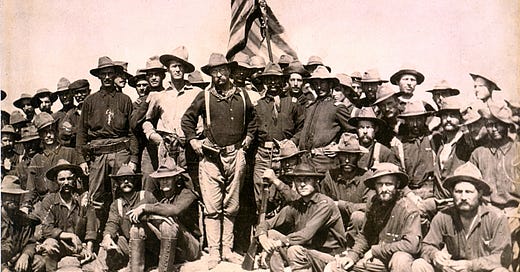


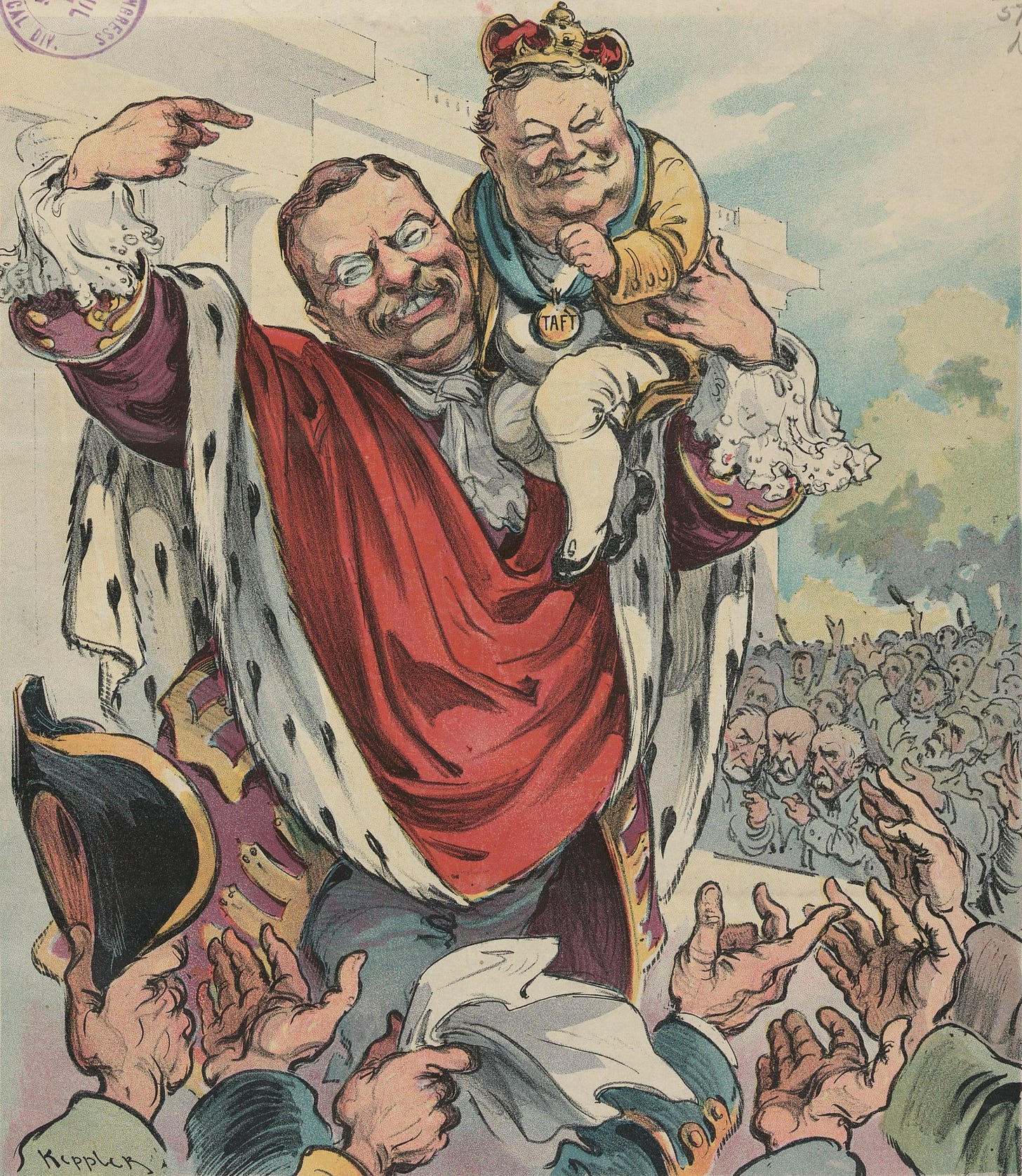

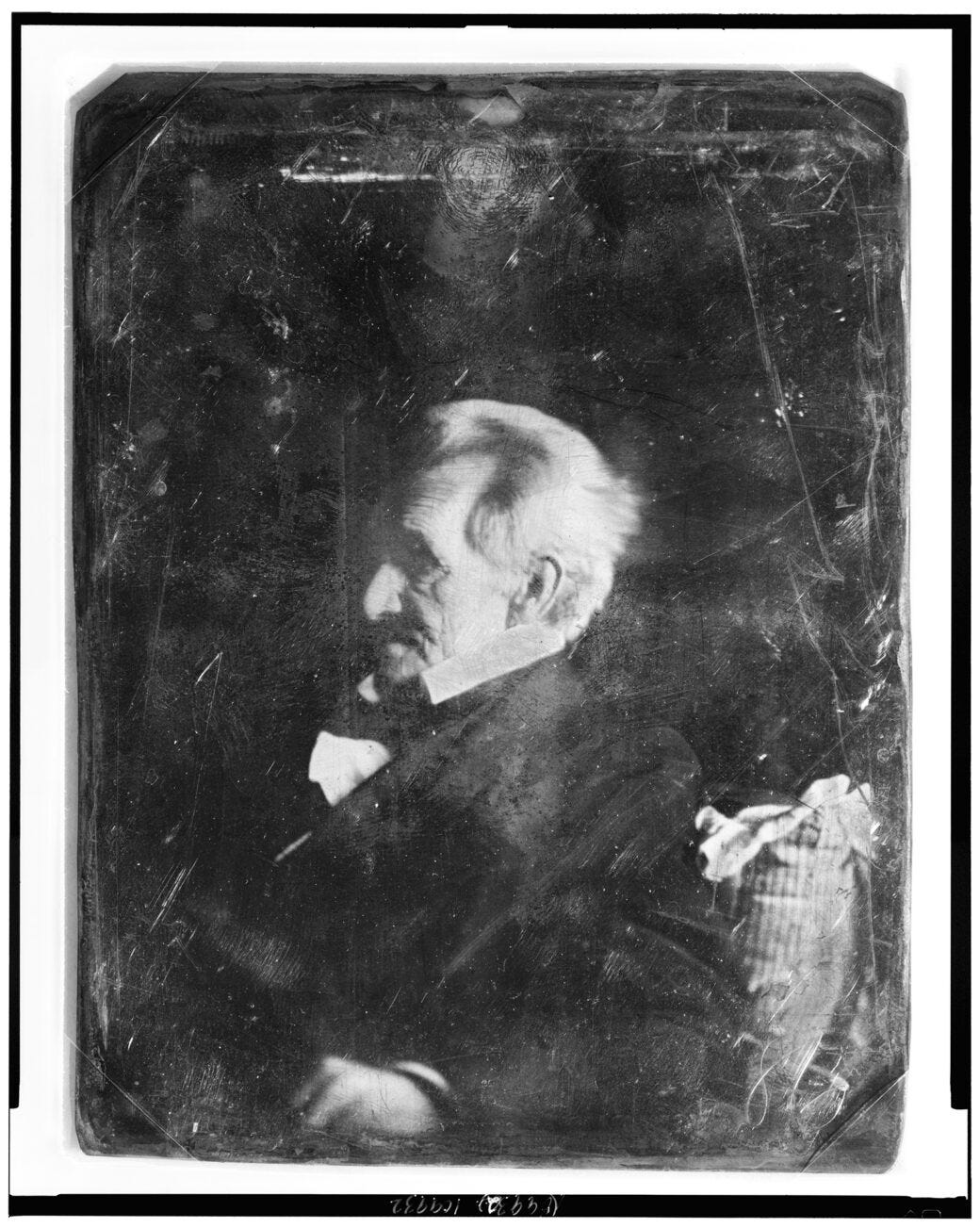
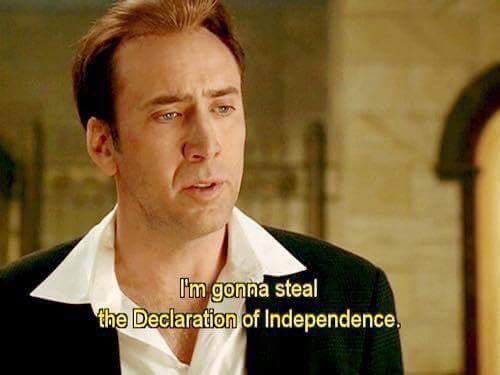
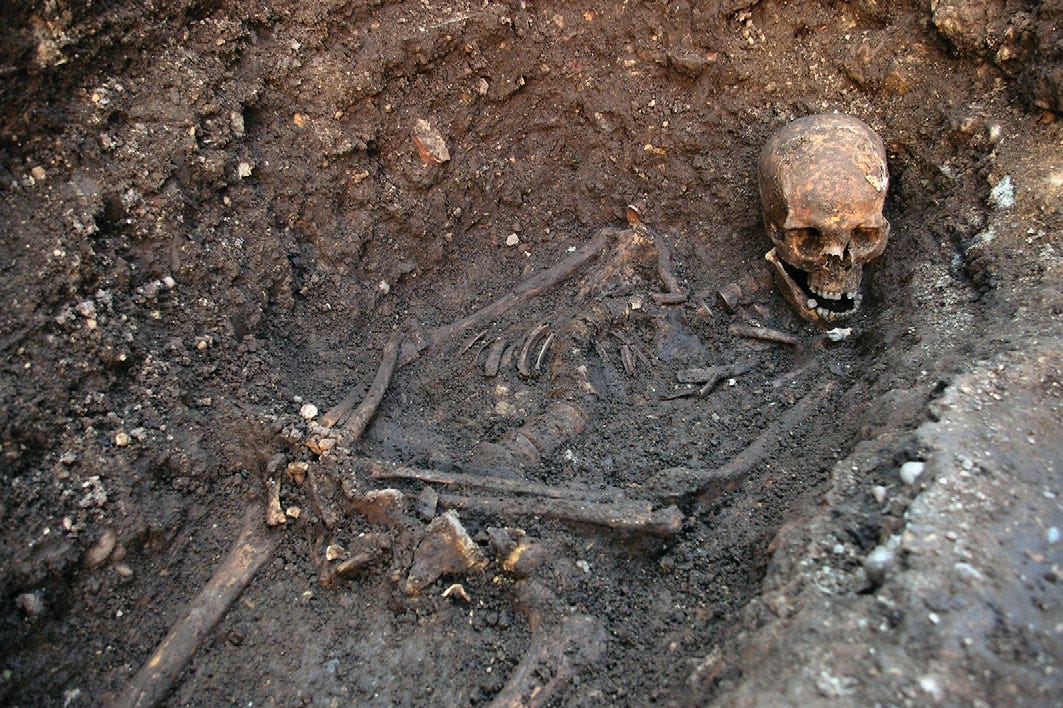


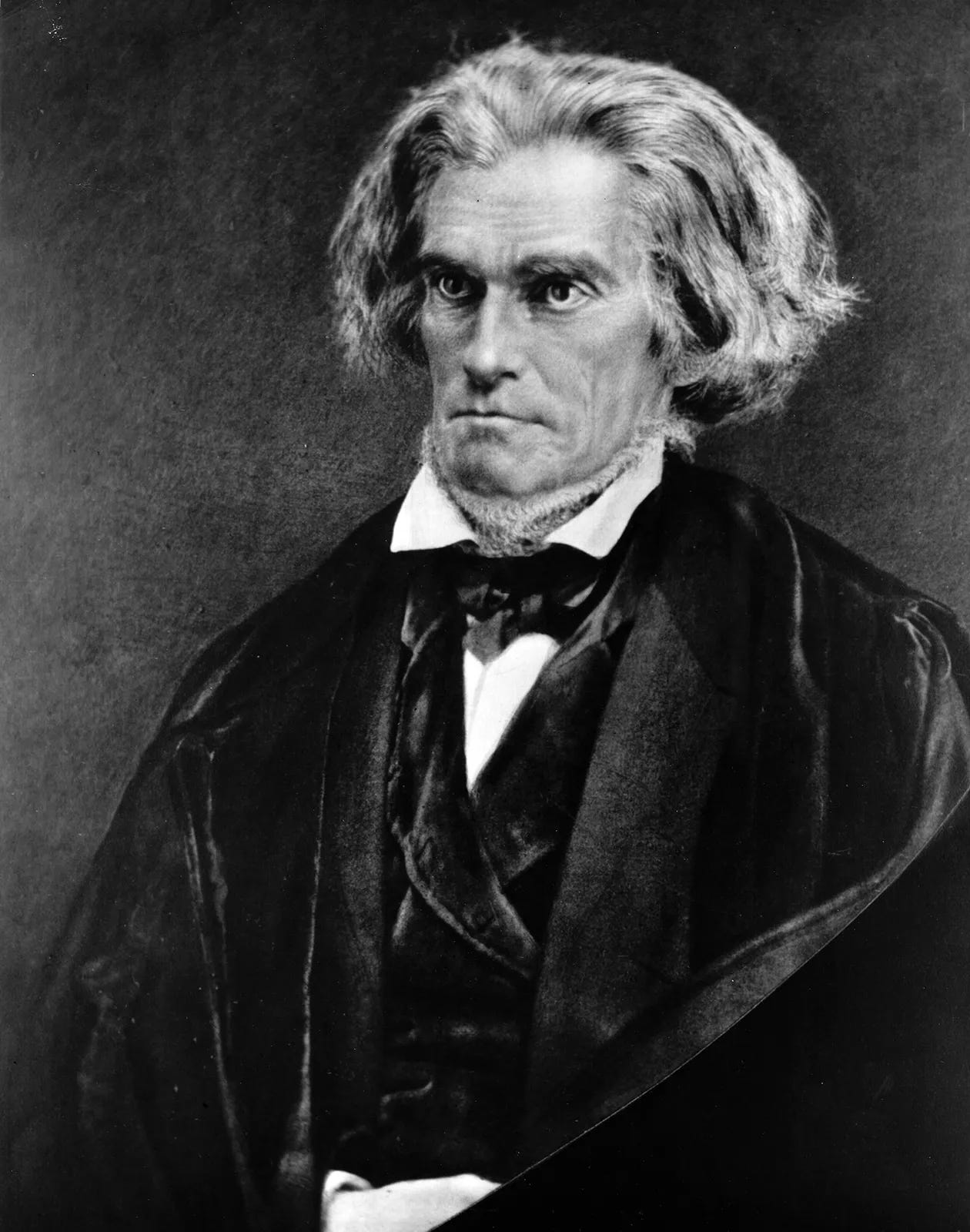
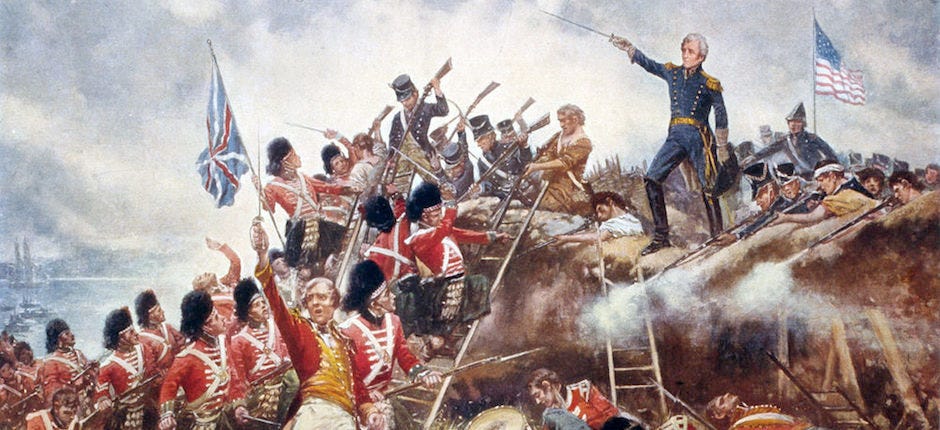

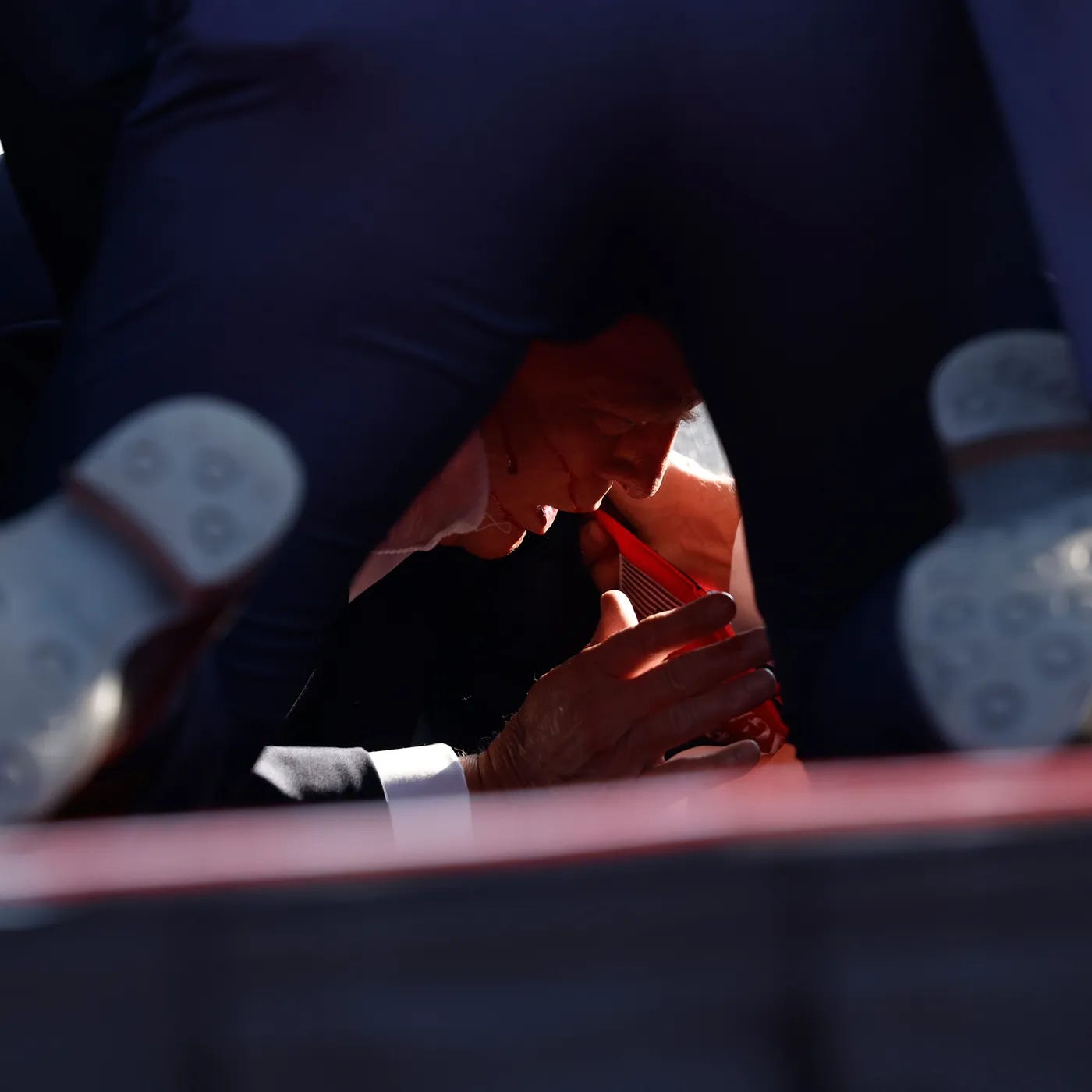
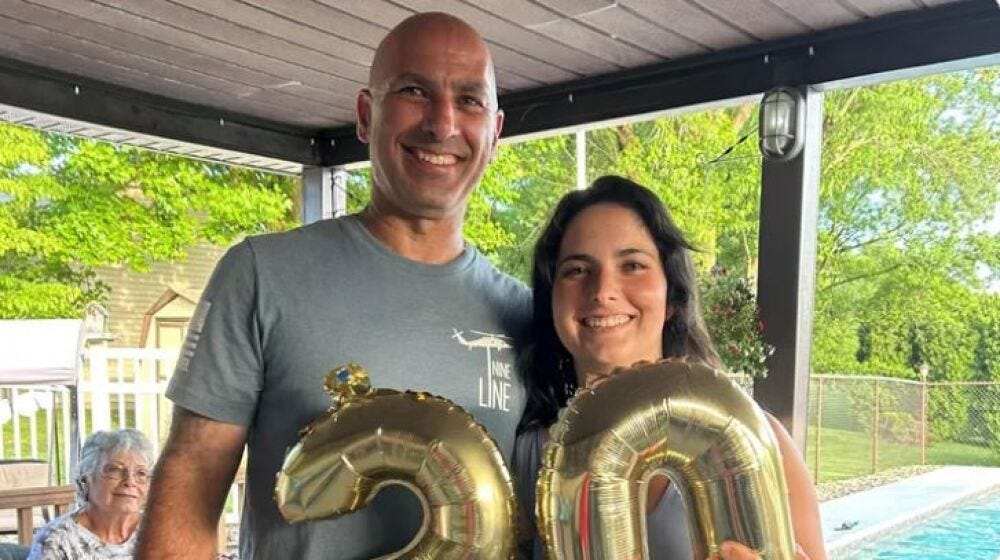
As I commented on Librarian of Calaeno's post about this, we've just avoided our parallel to the assassinations of the Gracchi brothers. Things aren't hot enough (and people are still far too comfortable) for a more widespread conflagration, but Trump's death would have no doubt signaled the beginning of the normalisation of political violence. And not that sort of thing that the newspaper thinkpieces and television talking heads have been whining over since 2015 - actual, serious violence. The kind that makes every country between the Rio Grande and the Rio de la Plata a festering sore, the kind that America hasn't seen since the '70s at least. We all got very lucky indeed on Saturday (even if I think that this is just a stay of execution)
Good article. Rip Corey Comperatore.
Andrew Jackson, Theodore Roosevelt, and Huey Long are the three great Americans in my opinion.
Every Man A King!